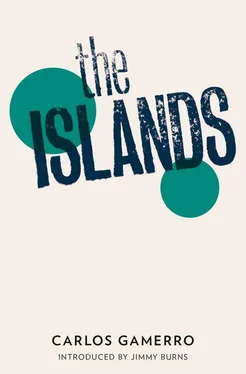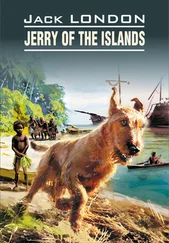ask
, which merges in ideas so dissimilar as those of ‘begging’ and ‘enquiring’. Another token of the primitivism of their tongue is the astonishing (for a Westerner) abundance of onomatopœias, which must inform ninety per cent of it, thus disqualifying it as a potential vehicle of abstract or even rational thought. We need only cite a few examples, such as
caw
(the cry of a bird, esp. that of a crow),
splash
(to spray with water),
crash
(to collide),
kick
(to strike with the foot),
stillness
(the absence of motion),
taut
(tight),
slack
(loose, e.g. of a wire; by extension, of a guard or watch),
whimper
and
whine
(two types of sighing sounds made by a puppy dog: the former broken; the latter continuous),
bang
(the noise of a shot or report) or
ooze
(to flow, of a thick substance, e.g. honey or treacle). But far from dismissing their tongue as coarse or deficient, we dare claim it to be admirably adapted to the practical needs of their daily lives. Is there anything in their existence that might cause the higher powers of the mind to be brought into play? What is there for imagination to picture, for reason to compare, or judgement to decide upon? They have nothing to imagine, nothing
to compare, nothing to decide. To slaughter a sheep requires not even cunning, that lowest power of the mind. Their tongue remains sunk in the primordial humus, for which they have as many terms as we do for the elevated fruits of thought; so it is that our ‘mud’ is said in ways as diverse as
sod, slime, sludge, muck, silt, slough, scum
; or our ‘marsh’ in ways as varied as
bog, peat, mire, swamp, grimpen, quagmire, quicksand, cesspool, moor, morass
Where we see a single object and denote it with a single word, e.g. ‘snow’, they have available a battery of terms to characterise it in its most minute variations:
flurry, blizzard, hail, sleet, flake, ice, frost, hoar, rime
Not to mention the various names for water, which reigns over the Islands for the three seasons that the snow does not own:
shower, drizzle, deluge, flood, rain, downpour, soak, drench, inundate, lake, lagoon, pond, pool, tarn, stream, creek, brook, spring, rill, rivulet, streamlet, runnel, torrent, rapid, current, waterfall, cascade, linn, cataract, fountain, eddy, swirl, flow, run, issue, gush, pour, spout, drip, dribble, drain, trickle, percolate, bubble, gurgle, spurt, spill, flow, sea, wave, surge, roller, surf, breaker, sprinkle, drown
.
Whilst beholding these men — though at times one has to struggle to remember that we belong to the same species — and their habits of life, one inevitably asks, whence have they come? What could have tempted, or what change compelled, a tribe of men to leave the fine regions of the North, and then to settle on one of the most inhospitable countries within the limits of the globe? It is difficult to conceive, even with a supreme effort of the intellect; and yet the evidence of the senses
defies the reflections of our mind: for they are here, and their number seems to increase, albeit slowly, from generation to generation, therefore we must suppose that they enjoy a sufficient share of happiness, of whatever kind it may be, to render life worth having. Nature by making habit omnipotent, and its effects hereditary, has fitted the Islander to the climate and the productions of his miserable country.
27th May 1982
— On inspecting the dwellings of the natives, I find remains of what might have been an infinitely more developed civilisation than the current one. Automobiles, refrigerators, fire-arms, books, tools, and cutlery bear witness to a Golden Age, from which, fall after fall, they have reached to this wretched present. The study of this ancient civilisation under the virtual laboratory circumstances provided by the isolation of this island will perhaps serve to dispel one of the most absurd and corrosive ideologies to have undermined the foundations of our civilisation: the one that would have the only being created in the image and likeness of the Lord descended from the wild beasts of the wood. How can we explain the presence of these people more than a thousand kilometres from the nearest civilised coast, unless we suppose that the Creator formed us all alike and all at once, distributing us uniformly and at his discretion across all the regions of the Earth, and that it is those who have not learned to worship him that have degenerated until they resemble the monkeys and lower animals?
28th May 1982
— In the morning a couple of enemy planes
overflew the area at low altitude, and the two soldiers on guard fired on them with their automatic rifles, but failed to shoot them down. The most striking thing was the reaction of the Islanders: some ran outside, waving their arms aloft at the planes and pointing to the shed building where the rest were housed. I cannot find an explanation for their behaviour: perhaps they consider the plane — which they may well be seeing for the first time — an irascible deity from heaven, whose power has to be placated with supplications and invocations. I have heard of similar cases in the South Pacific.
29th May 1982
— Dawn breaks with warmth and radiant sunshine, so much so that I order the Kelpers, after their breakfast of boiled maté and bread has been served, to be brought outside under guard. It was a sight to behold: the smiles of the old folk, the forays of the children, the embraces of the couples, all enjoying themselves just as we would do on a family day out in the country. Having imparted the necessary orders and seen to other duties, I sat down on a sun-baked rock to smoke a cigarette and observe them. I gazed at the faces, lined and inexpressive as though carved in granite, furrowed by cracks and crevices like the steep crags of the surrounding hills and covered with bristly beards that made them look more like foxes, bears, or boars than human beings; the hardy bodies clad in
tweed
(a coarse material, similar to our burlap, but of woven wool), just as their lands are clothed in a blanket of peat, the pale, milky-blue eyes that reflect the perpetually washed-out skies of their
island home. Men and women of the land, their bones the stones, their pulse the pulse of the island torrents and seas, in harmony with their environment for generations. Was it not a mistake to come to change all this? What could so-called civilisation offer them, other than to complicate and dilute their simple way of life? Would it not be better to withdraw now, before it was too late, and pray that the Islands should remain undiscovered for several millennia to come, that we should go on living in the knowledge that at least Eden survived in some distant corner of the planet, even if inaccessible to us?
30th May 1982
— Today I have made a discovery that may change the course of the war. I was making my evening rounds of the shed, where the various families have recreated their precarious tribal order, gathering round their wretched belongings and plotting imaginary limits with stretched ropes and hanging blankets. The stench is unbearable. On my rounds, I discovered in the mouth of an old man with thick, white whiskers the gleam of gold, and also in the ear-ring of a young girl with hair of the same colour. Questioned by the tongue-talker about the provenance of the precious metal, some of them pointed to the North, repeating a word that sounded like
ingo-land, ingo-land
I found the tongue-talker’s explanation profoundly irritating. They wished to have me believe that it came from a far-off country in the North, beyond the Equator. I informed him that I would execute the
Читать дальше











